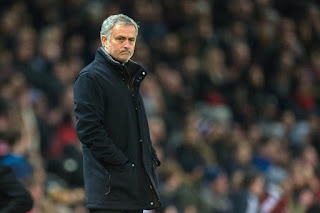By Oliver Kay
In an ill-judged attempt to hark back to his prime, and to miserable days that others might have forgotten in Manchester United’s glorious past, José Mourinho found himself telling us that defeat in the Champions League’s first knockout stage was “nothing new” for Manchester United. He reminded us smugly how he inflicted two of those defeats himself, beating Sir Alex Ferguson’s team with Porto in 2004 and Real Madrid in 2013.
It was also a reminder of something else: of how different Mourinho seemed when he swaggered into the English consciousness 14 years ago as the supreme leader and strategist behind Porto’s Champions League triumph. At 41, he was the charismatic, hip, young gunslinger to Ferguson’s grizzled sheriff. Memories endure of his celebratory sprint down the Old Trafford touchline when Costinha secured Porto’s 3-2 aggregate victory.
Less widely remembered is how Mourinho, disdainful of any reputation but his own, infuriated Ferguson after Porto’s 2-1 win in the first leg. When Ferguson refused to shake his opponent’s hand after the first leg, taking exception to the Porto players’ theatrics, Mourinho accused the United manager of sour grapes. “I understand why Ferguson is a bit emotional,” the Porto coach said. “He has some top players in the world and they should be doing a lot better than that. You would be really sad if your team gets as clearly dominated as that by an opponent who has been built on maybe ten per cent of the budget.”
What goes around comes around. At Old Trafford on Tuesday night, Mourinho was the manager left embarrassed, or at least “sad”, at seeing his United team outperformed in almost every respect by a Seville side assembled at a fraction of the cost. Seville are not paupers, but the most expensive player in Vincenzo Montella’s squad is Luis Muriel, a £19.3 million signing from Sampdoria last summer, who toiled to little effect until making way for Wissam Ben Yedder, an £8.5 million bargain, who scored twice in four minutes. Dominating midfield were Éver Banega, re-signed from Inter Milan for £6.3 million last summer, and Steven N’Zonzi, who cost £7.2 million when Seville signed him from Stoke City in 2015. United’s three substitutes alone (Paul Pogba, Juan Mata and Anthony Martial) cost £170 million.
United have what the young Mourinho would have called “some of the top players in the world” — in terms of profile and reputation — but, watching them, the uninitiated may struggle to work out who these outstanding talents are. David De Gea, certainly, even if he was not at his unbeatable best on Tuesday, but which of Pogba, Martial, Alexis Sánchez, Mata, Marcus Rashford and Romelu Lukaku consistently looks the part? Rarely has so much money been lavished on creative and attacking talent to such underwhelming effect.
The Spanish press, while lauding Seville, seemed disgusted by what they had seen from United. El Mundo Deportivo called them “millionaires but misers — so much but so poor” while Marca called them “a walking monument to mean-spiritedness, an unattractive, fearful team, rich in resources but lamentable in its play”. AS derided Mourinho’s “troglodyte model”.
It is damning and, in terms of outlook and spirit, much of it is fair comment. That line about “troglodyte” football is rather excessive, but it could easily stick if Mourinho persists in playing in straight lines and building attacks around the aerial threat of Marouane Fellaini and Lukaku while, across town at Manchester City, the creativity of Kevin De Bruyne and David Silva and the speed, skill and incisiveness of Raheem Sterling, Leroy Sané and Sergio Agüero have been assembled by Pep Guardiola to produce some of the most mesmerising football of the Premier League era.
AS painted Mourinho as “a washed-up rock star, one of those guys who goes around holiday hotels for pensioners, playing old hits on an organ with the bass and percussion playing on a tape recorder”. That is a caricature too far, but it is one that the United manager is under growing pressure to dispel.
He seems to have decided that every big game must be reduced to a war of attrition. Sometimes it works, as it did in winning the Europa League and League Cup last season and beating Chelsea and Liverpool in recent weeks, but it is an approach that has obvious limitations and, for the money invested, it certainly does not seem to be getting the best out of many of United’s attacking players consistently.
There will always be roundheads as well as cavaliers in football, pragmatists as well as idealists, but football at the highest level has evolved since Mourinho won the Champions League with Porto in 2004 and Inter Milan in 2010. Safety-first, risk-averse football has largely gone out of fashion. It worked for United in winning the Europa League last season, when they were able to grind their way to two-legged victories over moderate opponents, but it looked terribly limited against Seville. In 180 minutes of football, they managed just four shots on target.
In truth, it would be an insult to his work at Porto, Chelsea, Inter Milan and Real Madrid to suggest that it is typical Mourinho football. Typical Mourinho football involves far better organisation, far more resilience, far more incisiveness and a far stronger spirit than we have seen from his United team. This does not resemble a classic Mourinho team and it certainly does not resemble a classic United team. Winning the FA Cup would be a classic Mourinho response, and a not unexpected one, but nearly two years into his tenure, United are not where they want to be — nor, whatever the mess he inherited, where they should be.
This article first appeared on The Times where Oliver Kay is the Chief Football Correspondent.


Comments
Post a Comment